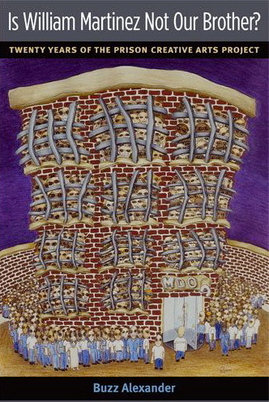Recent panel discussion addresses the value of arts in prisons

"Is William Martinez Not Our Brother?" by Buzz Alexander
"Is William Martinez Not Our Brother?", the newest book from University of Michigan professor Buzz Alexander, discusses the inception and the 20-year evolution of the Prison Creative Arts Project (PCAP). He and four other guests presented on Wednesday evening at the University of Michigan Hatcher Graduate Library to discuss the book and the value of the project.
The other panelists included recently released inmates, Stacy Barker, Ronald Rohn, and Michelle Southers and Natalie Holbrook, director at the American Friends Service Committee prison project. The questions and answers between the panelists and audience ranged from panelists' personal experiences of coping in prison and what their involvement with PCAP has meant to them to a projected outlook of what importance this and other programs may be allocated given Tuesday's election.
PCAP began in 1990. The organization's mission is to work with incarcerated individuals, adults and youth and those who have been incarcerated in the past "to strengthen communities through creative expression." Their literature also explicitly states that core values include the beliefs that all "have the capacity to create art; Art is necessary for individual and societal growth, connection, and survival; Art should be accessible to all." Workshops and projects include theater, creative writing, music, dance and visual arts.
The panel event began by Professor Alexander reading excerpts from his book, including sections entitled Inside the Walls and The Walls. These pieces not only address what types of workshops participants engage in, but also create the setting in which they work. There is no doubt when listening to Alexander read his words aloud that this project is a deeply felt mission, motivated by an empathy rarely heard.
In The Walls he writes, "The incarcerating walls of constructed from many materials. Tormented, alienated, overcrowded homes, dangerous streets.... Low expectations, degradations, accumulated insults to the spirit.... The humiliations of count time, of arbitrary orders, of lost control in almost every aspect of one's life... of food that bloats, of constant noise, constant boredom, of stabbings and rape, of having to watch one's back, of having no choice as to one's company, of parole board denials, of knowing the public hates you, of being imagined as a person without loved ones or aspirations or creativity...."
After creating this setting for the audience, the panelists spoke - initially briefly about their own time in prison. One had arrived three months after her 21st birthday and watched to adapt to her new surroundings; another had spent 21 years in prison. This was not a panel discussion about whether one should be penalized for crimes, but rather about the impact that the current system has on its inmates and why these participants found PCAP to be valuable. Ronald Rohn, whose artwork is on the cover of the book, stated that it "gave me a place to come to other than the streets." Rather than returning to his old environment and re-offending, he now has a different path.
In the end, this discussion touched on a few of the complexities of incarceration, our current judicial system, and durability of the human spirit.
Julia Eussen received her B.A. in English from Kansas State University. She is currently a graduate student in Eastern Michigan University's Professional Writing Program. She is also an active member of the Ann Arbor Classics Book Group and has recently begun to re-acquaint herself with good poetry. She can be reached at jeussen@emich.edu.

